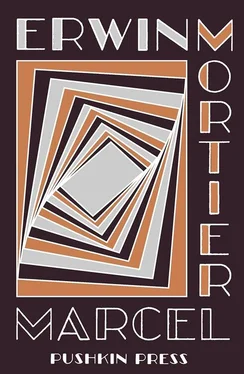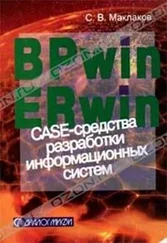He pursed his lips and whistled. “He was a quite a speaker in his day, you know.”
*
Wieland’s nose must have been itching again, for he squeezed his nostrils between his thumbs and rubbed up and down at length. The mattress began to heave, making some large photos spill out on the none-too-clean bedspread along with a sheaf of snapshots.
“Take a look at this. You know who they are, don’t you?”
There were two men, one of whom wore an elaborate belted uniform with braiding and epaulettes, topped by an outsize military cap.
“That’s our Dad,” Wieland said, beaming. “Good uniform, eh? Überscharführer . He says it was the best time of his life.”
Überscharführer .
There’s no moustache, I thought, he ought to have a moustache. I didn’t know why. All I thought was: Überscharführers always have moustaches, and he hasn’t got one. His face was very ordinary: pale, lumpy, short thick nose, eyes peering out of measly wire-framed spectacles. A shopkeeper in fancy dress.
I swallowed hard and glanced at Wieland.
He grinned. The downy black hairs on his upper lip lay in perfectly regimented lines.
“And that one there,” he said. “You know who that is, don’t you?”
Next to the shopkeeper in disguise stood a slim figure in a dark, unshowy uniform. Instinctively I blurted: “It’s Marcel.”
“Our Dad always says Marcel could have gone far. He could have done a lot to help the Flemish cause. It’s a shame he died before …”
Wieland shut the album, jumped up and put it back in the drawer.
Silence fell. I just sat there, stroking the bedspread.
He watched me narrowly.
“Great pictures, eh?”
“Yes, yes.”
He sprawled on the bed again, letting his hand rest chummily on my shoulder. “I know what people say behind our backs. Do they call you ‘blackshirt’ at your school too?”
He didn’t wait for me to reply.
“Mind you, I couldn’t care less … Come on, let’s be blackshirts and talk about girls.” He wrinkled his nose. “You got a girlfriend?”
I stammered non-committally.
“I suppose not. They’re always a bit backward in the country … I’ve got one, though.”
“What’s her name?”
“Kathy.” His voice cracked again. He jiggled his right foot and tossed the lock of hair from his forehead for the umpteenth time.
“Wouldn’t it be a good idea to get your hair cut sometime?” I asked, to change the subject. “It keeps getting in your eyes.”
“Girls are crazy about long hair,” he boasted. “Wait. I’ll show you a picture of Kathy.”
He sat up and raised his right arm to the bookshelf over the bed. His hand fumbled around, tipping a tin soldier onto his pillow, followed by a stamp bearing a postmark and a revolting crumpled handkerchief. He drew himself up further, lost his balance and fell on top of me. His dark jersey gave off a metallic body smell. I tried to push him off.
“Sorry,” he stammered. It sounded a little too studied.
His bony hands gripped my shoulders.
“Let me go, runt.”
He flattened me against the mattress, drew himself up again and planted his knees on my upper arms. His trousers crackled with static.
His face broke into a hard smile. “See if you can escape now.”
He took a deep breath and looked around with a show of unconcern.
“What shall we do? Any ideas? D’you know how to snog?”
I wasn’t sure I knew what he was getting at.
“Snog. Don’t you understand?”
He leaned over until his nose touched mine and his fringe tickled my eyelashes. His eyes were dark brown.
“Snog,” he repeated.
He put his lips to my right ear.
“What girls do. Not like this …” he said, moving his lips to my cheek, “… like this.”
He pressed his face down and ground his mouth against mine to force it open. I screwed up my eyes and clenched my jaws. His tongue wormed itself between my lips. Our teeth collided painfully.
He shrank back and wiped his lips with the back of his hand.
“Pig.”
He leaned forward for a renewed attempt. Suddenly his mother’s voice called from the landing: “Wieland!”
We drew back instantly and glared at each other from opposite sides of the bed.
“Wieland?” Anna repeated.
She pushed the door open a little way, eyed the pair of us carefully, put on a solemn expression and said: “Our Dad, Wieland, would like you to take a nice photo of us all.” She paused. “You know where the camera is.”
Wieland left the room. His mother motioned me to follow her.
“He didn’t try to tie you up, I hope,” she said. “He keeps wanting to play Red Indians. His friends don’t fancy it, so they’ve stopped coming to the house. All of seventeen and still playing games.”
Shaking her head she retreated to the sparsely-lit landing.
*
Cyriel was sitting in the biggest chair on the veranda, with cushions at his back and a tartan rug over his legs, which were propped up on the footstool Wieland had occupied before. He was wearing spectacles; the frames were slightly heavier than in the photograph taken forty years ago. The lenses enlarged his eyes in their deep sockets, making him look like an old carp gasping for breath.
The grandmother inclined her head sideways to catch what he was saying. I saw her stuffing a sheaf of papers into her handbag just as I came into the room.
“I kept them all for you,” I heard Cyriel say. His voice came in weak little gasps. Under his chin the flaccid skin sagged over his Adam’s apple, which rose with each laboured swallow to vanish into the wrinkles for a long time. Out of each nostril came a plastic tube connected to an oxygen cylinder suspended from a metal frame behind his chair.
“You should have them, they’re no use to Anna … His last letters … I still can’t read them without … You’re a strong woman, Andrea …”
The grandmother’s chin started to tremble and her lips were nowhere to be seen, the way they were early in the morning when her false teeth were still in their glass by the tap and she went about the house in her quilted dressing gown, her slippers flip-flopping on the floor. They were like camels’ feet in the sand. She even had a camel’s hump. When her shoulders sloped forward her spine made a bump between her shoulder blades. Without her false teeth she seemed quite desiccated. Her face would shrivel up, as though the water reservoir in her hump had run dry.
Cyriel had heard me come in. He turned his head in my direction and extended his hand. His fingers were bony and wide at the tips. They looked like drumsticks.
“Ha, the young grandson!”
I could feel the tremor in his fingers when he shook my hand.
He looked up at the grandmother, who was putting her handbag down at her feet.
“Marcel to a tee …”
“He’s inherited his mother’s eyes,” she said, “but for the rest — an out-and-out Ornelis.”
Cyriel turned to me again. “So you’ll be another staunch Fleming, will you?”
“That depends,” the grandmother said.
*
In the meantime Wieland had appeared with the camera, an unwieldy contraption in a dark leather case.
“I suppose I’ll have to use the flash,” he said eagerly, fitting a fresh film into the slot. “The sun’s gone now, and there’s not much light here because of the sheets on the roof.”
Mechanically, as if he were loading a gun, he clicked an outsize metal disc onto the camera. He held it up against his nose and stepped around the veranda like an automated Cyclops.
“Must find the best angle.”
The grandfather rose from his chair. “Quite an old model, isn’t it?”
“Never gave me any trouble …” Cyriel gasped. “Bought it in Cologne … Made in Germany, never wears out …”
Читать дальше












